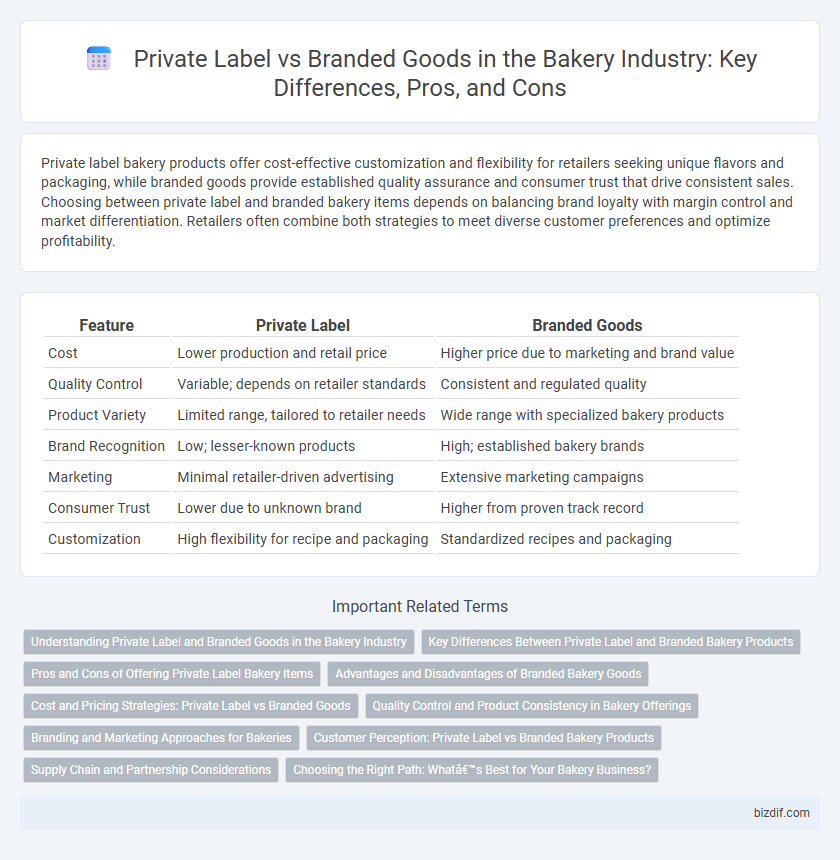Private label bakery products offer cost-effective customization and flexibility for retailers seeking unique flavors and packaging, while branded goods provide established quality assurance and consumer trust that drive consistent sales. Choosing between private label and branded bakery items depends on balancing brand loyalty with margin control and market differentiation. Retailers often combine both strategies to meet diverse customer preferences and optimize profitability.
Table of Comparison
| Feature | Private Label | Branded Goods |
|---|---|---|
| Cost | Lower production and retail price | Higher price due to marketing and brand value |
| Quality Control | Variable; depends on retailer standards | Consistent and regulated quality |
| Product Variety | Limited range, tailored to retailer needs | Wide range with specialized bakery products |
| Brand Recognition | Low; lesser-known products | High; established bakery brands |
| Marketing | Minimal retailer-driven advertising | Extensive marketing campaigns |
| Consumer Trust | Lower due to unknown brand | Higher from proven track record |
| Customization | High flexibility for recipe and packaging | Standardized recipes and packaging |
Understanding Private Label and Branded Goods in the Bakery Industry
Private label bakery products are manufactured by one company and sold under another retailer's brand, offering cost-effective options with customizable recipes and packaging to meet specific market demands. Branded goods in the bakery industry represent well-known names with established reputation, consistent quality, and dedicated marketing efforts that build consumer loyalty. Understanding the balance between private label flexibility and branded product recognition is crucial for bakery retailers aiming to optimize shelf space and profit margins.
Key Differences Between Private Label and Branded Bakery Products
Private label bakery products are manufactured by one company and sold under another retailer's brand, often offering cost advantages and customized recipes tailored to specific store demographics. Branded bakery goods, produced and marketed under a recognized brand name, emphasize consistent quality, established consumer trust, and extensive advertising campaigns. Key differences include private label products' competitive pricing and flexibility versus branded items' brand loyalty and perceived higher quality.
Pros and Cons of Offering Private Label Bakery Items
Offering private label bakery items allows bakeries to control product quality and pricing, enhancing brand loyalty while increasing profit margins through reduced marketing costs. However, private label products require significant investment in product development and packaging, posing challenges in differentiation and consumer trust compared to established branded goods. Balancing these factors, bakeries can leverage private label offerings to customize product lines but must carefully manage brand perception to compete effectively against well-known brands.
Advantages and Disadvantages of Branded Bakery Goods
Branded bakery goods benefit from strong customer recognition and perceived quality, driving higher sales and consumer trust. They often command premium pricing but require significant marketing investments and limit flexibility in product customization. Dependence on brand reputation can pose risks if quality issues arise or consumer preferences shift.
Cost and Pricing Strategies: Private Label vs Branded Goods
Private label bakery products typically offer lower production and marketing costs compared to branded goods, enabling retailers to price these items more competitively and capture higher profit margins. Branded bakery products often include added expenses related to brand equity and advertising, resulting in premium pricing strategies aimed at consumers seeking quality assurance and brand recognition. Cost-efficient sourcing and streamlined packaging for private labels contribute to aggressive pricing models that appeal to price-sensitive customers while maintaining retailer profitability.
Quality Control and Product Consistency in Bakery Offerings
Private label bakery products often undergo rigorous quality control protocols to ensure consistent taste, texture, and freshness that meet retailer standards. Branded goods typically invest heavily in product development and standardized manufacturing processes to maintain uniformity across batches, reinforcing consumer trust. Both approaches prioritize strict ingredient sourcing and production oversight to deliver reliable bakery offerings that satisfy customer expectations.
Branding and Marketing Approaches for Bakeries
Private label bakery products often emphasize cost-effectiveness and customization, allowing bakeries to tailor branding to local tastes and strengthen customer loyalty through exclusive offerings. Branded goods benefit from established market recognition, consistent quality perception, and widespread promotional campaigns that enhance consumer trust and visibility. Effective bakery marketing strategies balance these approaches by leveraging private label flexibility with branded goods' strong identity to optimize market positioning and drive sales growth.
Customer Perception: Private Label vs Branded Bakery Products
Customer perception of private label bakery products often emphasizes value and affordability, attracting budget-conscious shoppers seeking quality at lower prices. Branded bakery goods typically benefit from strong brand recognition and perceived premium quality, fostering higher trust and loyalty among consumers. Market research indicates that private labels have improved in taste and packaging, gradually narrowing the gap in consumer preference with established branded bakery items.
Supply Chain and Partnership Considerations
Private label bakery products often demand streamlined supply chain coordination to maintain cost efficiency and ensure consistent quality, leveraging close partnerships with ingredient suppliers and manufacturers. Branded goods typically involve more complex logistics and marketing-driven distribution strategies, requiring collaboration with multiple stakeholders to uphold brand standards and consumer expectations. Strong supply chain integration and transparent partnerships are critical in both models to optimize production timelines and respond swiftly to market fluctuations.
Choosing the Right Path: What’s Best for Your Bakery Business?
Choosing between private label and branded goods significantly impacts your bakery's market positioning and profit margins. Private label products offer higher customization and cost control, allowing bakeries to create unique recipes that resonate with local customer preferences. Branded goods typically bring established consumer trust and marketing support, which can drive higher sales volumes but often come with lower profit margins and less product flexibility.
Private Label vs Branded Goods Infographic

 bizdif.com
bizdif.com